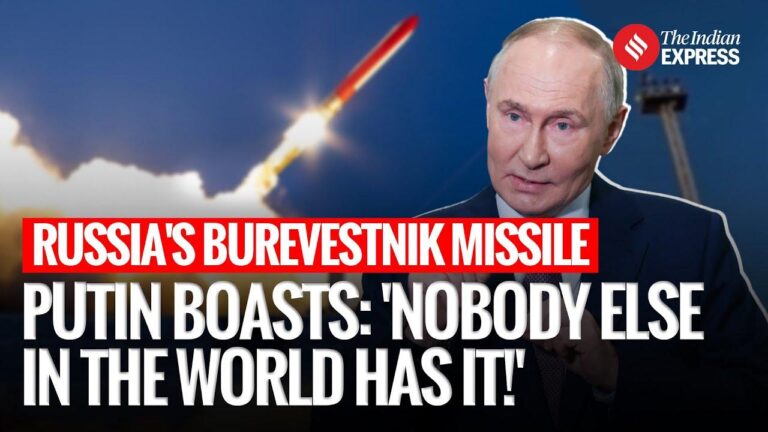In a recent development that has drawn international attention, U.S. President Donald Trump condemned Russia’s test of the Burevestnik missile as “inappropriate,” signaling heightened tensions between the two global powers. The Burevestnik, a new Russian nuclear-powered cruise missile, has been a subject of strategic concern due to its potential to evade existing missile defense systems. This article explores the implications of Russia’s missile test, the response from the United States, and the broader context of escalating military competition.
Russia’s Burevestnik Missile Raises Global Security Concerns
The recent test launch of Russia’s Burevestnik missile has sent ripples through the international community, sparking sharp reactions and heightening nuclear anxiety. Designed as a nuclear-powered, long-range cruise missile, Burevestnik’s unique propulsion system theoretically allows it to evade existing missile defense mechanisms by maintaining virtually unlimited flight duration. However, experts warn that the weapon’s untested nature and its reliance on nuclear propulsion pose significant environmental and safety risks, exacerbating global security tensions.
In response to the test, former U.S. President Donald Trump publicly condemned the action, calling it an “inappropriate” move by President Putin. His remarks underscore the growing concern among global leaders about the destabilizing impact of such advanced weapons development. Key points driving international worry include:
- Destabilization of Nuclear Deterrence: Unpredictable new capabilities may trigger arms races and strategic miscalculations.
- Environmental Hazards: The missile’s nuclear propulsion risks catastrophic fallout if it crashes during testing or deployment.
- Escalated Geopolitical Tensions: Increased mistrust among NATO and Russia, complicating diplomatic efforts.
| Aspect | Potential Impact | International Response |
|---|---|---|
| Flight Range | Unlimited (nuclear-powered) | Heightened surveillance and sanctions |
| Detonation Capability | Nuclear warhead delivery | Calls for renewed arms control talks |
| Environmental Risk | Radioactive contamination on failure | International environmental monitoring |
Trump Labels Putin’s Missile Test as Inappropriate and Provocative
Former President Donald Trump sharply criticized the recent missile test conducted by Russia, describing the move as both inappropriate and provocative. Trump emphasized that such actions risk escalating tensions between global powers, particularly as geopolitical dynamics remain fragile in Eastern Europe. He called on international leaders to respond firmly to deter further destabilizing military demonstrations and underscored the need for clear communication channels to avoid misunderstandings that could lead to conflict.
Analysts note that the missile in question, part of Russia’s advanced nuclear arsenal, represents a significant technological development with potential implications for global security frameworks. Trump’s comments were punctuated by a reminder that maintaining peace requires vigilance and accountability from all nuclear-armed states. Below is a brief overview of key aspects surrounding the missile test:
- Missile Name: Burevestnik (Nuclear-powered Cruise Missile)
- Test Date: Mid-May 2024
- Potential Range: Unlimited, theorized due to nuclear propulsion
- Response from the US: Condemnation and calls for diplomatic discussion
| Aspect | Russia’s Burevestnik | US Position |
|---|---|---|
| Technology | Nuclear-powered, cruise missile | Concerned over destabilizing new weapons |
| Impact | Potentially unlimited range | Urgency for arms control talks |
| Diplomatic Reaction | Justified as defense necessity | Described as provocative act |
Experts Urge Diplomatic Dialogue and Strengthened Arms Control Measures
In light of the recent Burevestnik missile test, international experts are emphasizing the urgent need for renewed diplomatic engagement to prevent further escalation. Many voices within the global defense and diplomatic communities stress that unilateral advancements in nuclear-capable weapons risk undermining existing arms control frameworks. They advocate for transparent communication channels between major powers to restore trust and reduce the possibility of miscalculations that could lead to destabilizing conflicts.
Alongside diplomatic talks, specialists call for the modernization and reinforcement of arms control agreements that have weakened over recent years. The consensus highlights the importance of:
- Extending verification protocols to include emerging missile technologies
- Enhancing mutual compliance measures with clear consequences
- Promoting collaborative monitoring systems for real-time data sharing
| Key Arms Control Proposal | Expected Impact |
|---|---|
| New Missile Test Moratorium | Limits nuclear escalation risks |
| Expanded Treaty Verification | Improves transparency |
| Joint Crisis Communication Hub | Reduces diplomatic tensions |
Future Outlook
As tensions between the United States and Russia continue to simmer, the controversy surrounding the Burevestnik missile test underscores the challenges of arms control and strategic stability in the current geopolitical climate. With President Trump publicly denouncing the test as “inappropriate,” the incident has further complicated diplomatic efforts and raised questions about the future of nuclear weapons development. Observers will be closely monitoring how both nations navigate this sensitive issue in the coming months.




